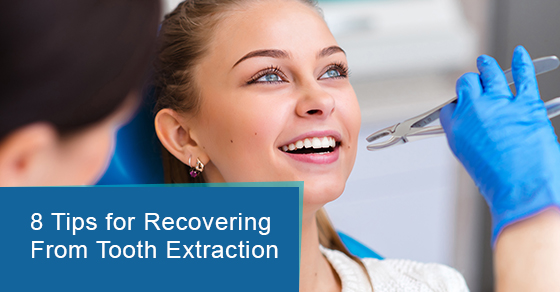
Whenever you have a tooth that is severely decaying, damaged or impacted (such as with wisdom teeth), tooth extraction may be your best bet to fix the problem. Depending on the severity of your case, the tooth may be extracted using forceps or by cutting into the gums.
Suppose you suspect dental issues that may require a tooth extraction. In that case, it’s a good idea to speak with your dentist and have them conduct a proper examination before diagnosing you and offering treatment options.
Usually, dentists will try to do everything they can to salvage teeth before extracting it. However, if a tooth extraction is your best option, you can rest assured that the procedure is safe and rarely results in complications. However, as with all procedures, there is always some risk involved for the patient. Below are some of the best aftercare tips for recovering from your tooth extraction procedure.
Use Medication as Directed
To manage pain after a tooth extraction, your dentist may prescribe pain medication to you. Use this medication as directed, and it should help in your healing process. Avoid driving or operating heavy machinery if your medication induces drowsiness. If your dentist doesn’t prescribe pain medication, you should ask them if you can use over-the-counter medication instead, should you need it.
Utilize Ice Packs
Another way to help reduce swelling and manage pain is to use an ice pack on the extraction site. You can make an ice pack at home and apply it to the area for 10-15 minutes at a time. This should help with swelling and bruising within the first couple of days.
Brush Gently
To avoid dislodging the blood clot, you will want to brush your teeth gently and avoid the extraction area altogether. Don’t use any toothpaste, as this may be too abrasive. Do not brush, rinse, spit or use a straw within the first 24 hours of your tooth extraction unless otherwise instructed by your dentist. This is to ensure the blood clot does not dislodge and to help speed up the overall healing process.
Eat Soft Foods
To avoid trauma and pain in your extraction area, you should stick to soft foods that are easy to manage and consume while still recovering. Avoid sticky, sugary foods that can stick to your teeth and gums and produce excess bacteria in your mouth. Foods that you can safely and easily consume may be puddings, soups, eggs and yogurts. Cold treats such as frozen yogurts and smoothies may help with the healing process as well.
Rest and Self-Care
Remember to take time off from work and other social obligations to heal properly after tooth extractions. Depending on your tolerance and ability to recover, you may not need much time off at all. For others, a day or two off from work may be beneficial. Regardless, it’s important during this time to make sure that you are getting enough rest and high-quality sleep at night. Give your body time to heal and elevate your head slightly when you go to bed by using a pillow to prop yourself up.
Clean the Area Daily
Following your dentist’s instructions, it’s important to keep the extraction site clean and free from bacteria, food or build-up. Rinse your mouth a few times a day with warm salt water to disinfect the wound and aid the healing process. Avoid the extraction site when brushing or flossing. However, keep your mouth clean and rinse daily.
Avoid Smoking
Smoking can not only negatively impact the healing process by introducing dirt and bacteria into your mouth, but it can also potentially dislodge the blood clot after your extraction due to the sucking motion made when inhaling the smoke. Make all efforts to avoid smoking during this period so as not to disrupt the healing.
Consult Your Dentist
Should you come across any difficulties or unusual pain, bleeding, or side effects after your tooth extraction, you will want to consult with your dentist and book a follow-up appointment as soon as possible. Don’t be afraid to ask your dentist questions and discuss any problems you may be having with them.
Dental procedures like tooth extractions don’t have to be something that you dread. With proper aftercare, you can avoid complications and be on the road to a speedy, safe recovery. Although we try to avoid tooth extractions whenever possible, there are certainly times when they may be necessary for your overall oral health. Remember to disclose your family medical history to your dentist before undergoing any treatments or procedures so they can be well aware of any potential risks.
For more information on tooth extractions and family dentistry services in Mississauga and the GTA, please call Bristol Dental at 905-712-349 or contact us here.


Wisdom teeth extraction, though a fairly common dental procedure, needs expert guidance. Resting is vital to reduce any swelling, keeping an ice pack for the first 48 hours also helps, also advised to keep your mouth clean, etc